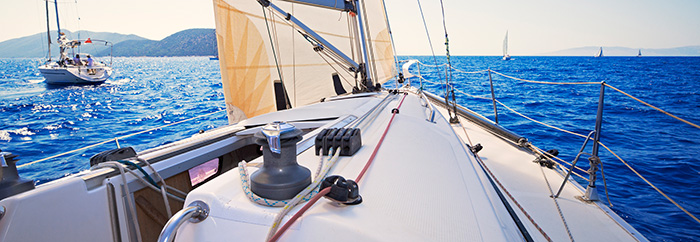Summer Fun: Boat Safety and Insurance Tips
Boating accidents are relatively rare considering that there are almost 11.8 million registered recreational water vessels on the nation’s waterways. But they do occasionally happen, sometimes with devastating results. The Coast Guard recorded 4,040 recreational boating accidents in 2022 that resulted in 636 deaths, 2,222 injuries, and approximately $63 million in property damage.1

Boat owners should always follow safe practices, and make sure to have appropriate insurance coverage. Here are some tips to consider.
Before You Leave the Dock
- Check weather forecasts before heading out. Let someone know where you’re going and when you expect to return.
- Check your engine, fuel, and electrical and steering systems; be sure to check for exhaust-system leaks.
- Carry one or more fire extinguishers appropriate for the size and type of boat. Keep them accessible and in good condition for immediate use.
- Equip the vessel with required navigation lights and a whistle, horn, or bell.
- Consider additional safety devices, such as a paddle or oars, a first-aid kit, a supply of fresh water, a flashlight, flares, a radio, a tool kit, and spare parts.
Out on the Water
- Make sure that the skipper and passengers wear U.S. Coast Guard-approved life jackets. In 2022, 85% of drowning victims in boating accidents were not wearing a life jacket.2
- Know and obey marine traffic laws. Learn standard distress signals.
- Be alert for other watercraft, swimmers, floating debris, and shallow waters.
- Don’t overload the vessel and take care to distribute the load evenly. Don’t stand up or shift weight suddenly in a small boat. Don’t permit riding on the bow, seatbacks, or gunwales.
- Never operate a boat while under the influence of alcohol or drugs. Alcohol use is the top contributing factor in fatal boating accidents and was the leading factor in 16% of fatalities in 2022.3
The U.S. Coast Guard Auxiliary offers free advice and boating safety courses. If requested, the auxiliary will conduct a free Vessel Safety Check (VSC) on your boat. Boats meeting safety standards are awarded a VSC decal that is recognized by law enforcement and safety organizations. Many insurance companies offer discounts for boats that undergo a VSC annually. For more information on boating education and safety checks, visit cgaux.org.
Insuring Your Boat
Homeowners or renters insurance policies may provide limited property damage coverage for small watercraft such as canoes, small sailboats, and powerboats with small motors (typically less than 25 horsepower). Liability coverage is generally not included; however, you may be able to add it as an endorsement.
Larger and more powerful boats (and personal watercraft such as jet skis) should be covered under a separate boat insurance policy. State requirements vary, but most lenders will ask for proof of insurance. Keep in mind that your homeowners policy may not cover your boat even if it is parked in the garage.
There are two types of coverage for physical loss or damage to the boat and permanently attached equipment:
Actual cash value — Pays for replacement costs less depreciation at the time of the loss. In the event of a total loss, market value is based on used-boat pricing guides and similar sources. Partial losses are paid based on the total cost of repairs minus a percentage for depreciation, and the policy deductible also applies. An actual cash value policy is typically the more economical alternative, but coverage is narrower.
Agreed amount value — Coverage is based on the value of your vessel as agreed upon by you and your insurer. In the event of a total loss, you would typically receive the agreed value minus the policy deductible. In a partial loss, these policies may replace structural items without any deduction for depreciation, after the policy deductible. An agreed value policy typically costs more than an actual cash value policy but offers broader coverage.
Watercraft policies generally exclude certain types of damage, such as normal wear and tear, defective machinery, and damage caused by mold, insects, animals, or zebra mussels.
Boat insurance usually also covers, up to policy limits, the following:
- Bodily injury caused to another person
- Property damage caused to someone else’s property, such as another boat or a dock
- Guest passenger liability for legal expenses incurred by someone using the boat with the owner’s permission
- Medical payments for injuries to the boat owner and other passengers
- Theft
Ask your insurance representative about coverage for special equipment kept on the boat, such as fishing gear and water skis. Also ask whether your insurance covers towing.
Spending time on your boat or other watercraft should be a relaxing break from the stress of everyday life. Take a few moments to review your coverage and be sure that you have the protection you may need.



